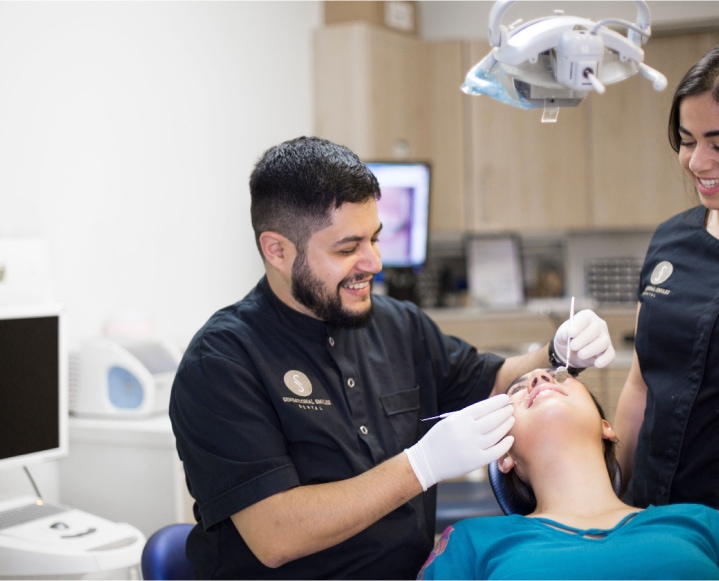
09 May Dental Implants Post-Operative Care
After a dental implant procedure, post-surgery care is critical in ensuring a speedy and smooth recovery. Pain management is often the first step and involves using over-the-counter pain relievers for mild discomfort, although stronger medication may be required based on your dentist’s recommendation. However, this battle against pain isn’t fought with medicine alone. Applying cold packs intermittently to your face and resting with an elevated head can also play a crucial role in alleviating discomfort and swelling. It’s clear that after-care isn’t just about pain management – it’s a thoughtful combination of rest, ice, and elevation. Let’s explore these strategies further.
Medication and Pain Management
After your dental implant surgery, you might experience discomfort or pain. This is completely normal, as your body is in the process of healing. Over-the-counter pain medication such as Ibuprofen (Advil, Motrin) or Acetaminophen (Tylenol®) can effectively manage mild to moderate pain by reducing inflammation and blocking pain signals. Following the prescribed dosage instructions for pain management is essential to ensure proper relief while avoiding potential side effects.
If you’re experiencing more severe or persistent pain after your dental implant surgery, it’s crucial to consult your dentist. The dentist may prescribe stronger pain relievers to provide adequate relief. It’s vital to communicate any discomfort or pain to your dentist so that they can address it effectively. For instance, your dentist may prescribe opioid medications such as Codeine or Oxycodone for short-term use when over-the-counter medications are not sufficient to manage severe pain. However, it’s important to take these medications exactly as prescribed and only for as long as necessary to avoid dependence or other adverse effects.
Overuse or improper use of pain medication can lead to various health risks and should be avoided. Each type of pain medication has specific recommended dosages and maximum daily limits. It’s important to remember that excessive use of certain medications, especially opioids, can lead to addiction and other serious health issues. Always consult your dentist or healthcare provider before starting or stopping any pain medication regimen. It’s also advisable to discuss any concerns or potential side effects with your healthcare provider to ensure safe and effective pain management throughout your recovery.
Understanding the details of appropriate pain management during the recovery phase after dental implant surgery. It sets the stage for a smooth healing process.
Managing Swelling and Discomfort
After dental implant surgery, it’s common to experience some swelling and discomfort. This is your body’s natural response to the surgical procedure. But don’t worry; several ways exist to effectively manage and reduce these post-operative concerns.
Applying Ice Packs
One of the most effective ways to reduce swelling after dental implant surgery is to apply ice packs to the side of your face for the first 48 hours. The recommended frequency for applying ice packs to reduce swelling is 20 minutes on and 20 minutes off. This alternating pattern helps constrict blood vessels, reduces inflammation, and relieves discomfort.
Head Elevation
In addition to using ice packs, keeping your head elevated while resting can help minimise swelling. Ideally, elevating your head at a 45-degree angle can help reduce fluid retention and alleviate swelling more effectively.
It’s important to understand that managing swelling and discomfort is an essential part of the post-operative care process.
Over-the-Counter Pain Medication
For mild discomfort and pain, you can take over-the-counter pain medication such as Tylenol® or ibuprofen every 3-4 hours. This can provide relief as you recover from the surgery.
Warm Moist Heat
If you experience stiff jaw muscles, which is not uncommon after dental implant surgery, using warm, moist heat can help relax the muscles. This can be particularly soothing as part of your post-operative care routine.
Realistic Recovery Expectations
Realistic expectations about recovery time are essential. The average duration of swelling after dental implant surgery is 2-3 days, after which it should gradually subside. Understanding these timelines can help put the recovery process into perspective.
Following these strategies for managing swelling and discomfort after dental implant surgery can significantly enhance your post-operative comfort and expedite healing. Taking proactive measures to minimise swelling and alleviate discomfort ensures a smoother recovery journey.
Diet and Nutritional Directions
After dental implant surgery, it’s crucial to fuel your body with the right nutrients to aid in healing. Soft and easily chewable foods will be your best choice during the initial days. When thinking of a soft diet, picture foods like mashed potatoes, smoothies, yoghurt, easy-to-chew fruits (bananas or applesauce), and well-cooked pasta and rice. The goal is to reduce strain on your jaw while acquiring essential nutrients. It’s important to remember that hard, crunchy, or sticky foods should be avoided for the first 3-4 days. These foods can cause discomfort at the surgical site and may dislodge the critical blood clot essential for proper healing and preventing dry sockets.
Staying hydrated is equally important. Increasing fluid intake supports the recovery process. However, using a straw should be avoided as it can create suction on the surgical site, potentially dislodging the crucial blood clot. For beverages, opt for room-temperature or cool drinks like water or herbal tea instead of hot or carbonated options that may cause discomfort. Planning meals may require extra effort but will make sticking with a soft diet easier during the initial days post-surgery. This is an opportunity to get creative with your meals—indulge in creamy soups or blend nutrient-packed smoothies. Paying extra attention to your diet significantly ensures a smooth recovery after dental implant surgery.
Carefully choosing your food is just one part of the overall picture in post-operative dental implant care. It is pivotal in supporting your body as it heals and sets the stage for successful recovery.
Maintaining Oral Hygiene Post-Surgery
Special care is essential to ensure proper healing of the implants. Within the first 24 hours after the surgery, it’s crucial to refrain from rinsing or spitting to allow for the formation of a blood clot in the surgical area, safeguarding the underlying bone and tissues as they heal. Once the blood clot has formed, usually after the first day, gentle rinsing with warm salt water after meals effectively flushes out any debris that may have accumulated. This helps keep the incision site clean, reduces the risk of infection, and promotes healing. Using warm water instead of hot water is important, as hot water can dissolve the blood clot and hinder the healing process.
Furthermore, continuing regular oral hygiene practices despite post-surgery discomfort is vital. Using a soft-bristled toothbrush to gently brush your teeth while avoiding disturbing the surgical area maintains cleanliness elsewhere in your mouth without causing harm to the healing site. Employing gentle strokes and avoiding excessive pressure supports the healing process.
It’s crucial to refrain from smoking for at least five days after surgery to promote proper healing and reduce the risk of complications. Smoking significantly impedes the healing process and has detrimental effects on oral health. The chemicals in cigarettes can delay wound healing, increase the risk of infection, and adversely impact blood flow—crucial factors during the postoperative period. Refraining from smoking for at least five days post-surgery fosters an optimal environment for healing and encourages successful outcomes for dental implants. Adhering to these post-operative oral hygiene practices actively contributes to a smooth recovery process and minimises potential complications.
Guidance for Rest and Activity
It’s important to give your body the time it needs to heal properly. This involves finding the right balance between rest and light activity. While resting is vital for recovery, engaging in too much activity can hinder healing. It’s all about finding the sweet spot that will allow your body to recover without compromising the success of the dental implant procedure. The recommended rest period after dental implant surgery typically spans 24-48 hours. During this period, you should limit physical exertion and abstain from strenuous activities for at least 3-4 days. During this initial recovery phase, it’s vital to be cautious of light-headedness due to reduced caloric and fluid intake.
The recommended rest period after dental implant surgery typically spans 24-48 hours. During this period, you should limit physical exertion and abstain from strenuous activities for at least 3-4 days. During this initial recovery phase, it’s vital to be cautious of light-headedness due to reduced caloric and fluid intake.
During the first week following your surgery, it’s advised to keep your activity level limited to light walking and minimal physical exertion. This gentle approach supports the healing process without causing additional stress or strain on the body. Consider adjusting your sleeping position to an elevated head position for the first few days after surgery to help reduce swelling. Additionally, applying ice packs on the side of the face for the first 48 hours can aid in managing swelling and discomfort. Adhere to the recommended activity levels and rest periods to allow your body to recover optimally. Remember, a successful recovery paves the way for better long-term outcomes.
By striking a balance between rest and light activity, you’ll foster a smoother recovery process and create favourable conditions for the success of your dental implant procedure.
Attending Follow-Up Appointments
Attending follow-up appointments at our dental clinic after your dental implant surgery is important for several crucial reasons. These appointments are not merely routine check-ups; they play a critical role in monitoring your healing progress and ensuring the success of the dental implant procedure. Your dentist will carefully assess the implant site during these visits, looking for any signs of complications or issues that may have arisen post-surgery.
These appointments typically occur at specific intervals, such as every three months for the first year and then every six months after that. It’s important to mark these dates on your calendar and prioritise attending them, as they are essential for maintaining the health and longevity of your dental implants.
During a typical follow-up appointment, your dentist will conduct a comprehensive oral examination to evaluate the implant’s stability and assess your overall oral health. X-rays may also provide a detailed view of the implant site and ensure that the bone integrates properly. This lets the dentist detect potential issues or irregularities early, enabling prompt intervention if necessary.
Additionally, the dentist will assess your oral hygiene practises and provide personalised guidance to ensure you effectively care for your dental implants at home. This proactive approach empowers patients to maintain optimal oral health and mitigate any potential risk factors that could compromise the success of their implants.
Active involvement in post-operative care, including attending follow-up appointments, is paramount in ensuring dental implants’ long-term success and well-being. Patients must recognise the significance of these appointments for their oral health journey.
In summary, following specific post-operative care instructions is important, including avoiding rinsing or spitting for the first 24 hours, applying ice packs to reduce swelling, and adhering to prescribed pain medication. Maintaining regular oral hygiene practices and attending follow-up appointments with your dentist is crucial to ensure proper healing of the implants. For detailed guidance, consult your dental provider or refer to our comprehensive post-operative care instructions on our website.
Sweet Bonanza 1000 shining crown Shining Crown Chicky Run Sweet Bonanza 1000 Fortune Rabbit pusulabet


